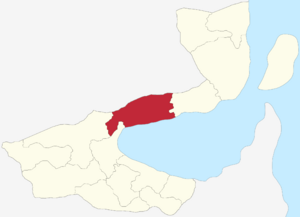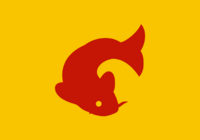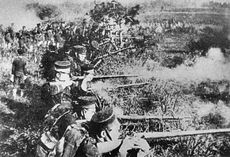Xiaogu
Xiaogu 枭谷州 Xiāogǔ zhōu | |
|---|---|
 Map of Monsilva with Xiaogu highlighted | |
| Country | |
| State status | 3 June 1983 |
| Capital | Zhangye (张掖) |
| Government | |
| • Body | Xiaogu State Government |
| • Premier | Kwan Juan-bo (FDP) |
| • Deputy Premier | Zhou Yong (FDP) |
| Population (July 2022) | |
| • Total | 3,653,017 |
| Time zone | AMT+13 (Monsilvan Eastern Time, MET) |
| ISO 3166 code | MS-XIA |
| GRP (¥) | ¥747 billion |
| Major airports | Zhangye Tanxi International Airport (ZTI) |
| Transit System(s) | MRA Zhangye Metro |
| Police[1] | Xiaogu State Police |
| Ambulance[2] | Xiaogu State Ambulance |
| Fire[3] | Xiaogu Fire Service |
Xiaogu (Monsilvan: 枭谷州; Pinyin: Xiāogǔ zhōu), is a state of the Monsilvan Republic. The state has around 3.65 million people, with 71% of them living in the state's capital, Zhangye. It is located on the Xiaguan stretch in central Monsilva, sitting north of Weishi and Bazhong, west of Maguan and south of the nation of Akvarelusus. Xiaogu is divided into the hilly, rural north and the flat, urban south. The state of Xiaogu is governed by the Xiaogu State Government, with Kwan Juan-bo of the FDP being the current premier. The state is divided into 6 districts, 18 counties, 39 legislative constituencies and 79 municipalities and is represented by 6 Senators in the Senate and 39 members in the Legislative Assembly. The Xiaogu State Parliament consists of 79 seats, and is currently lead by the FDP, with the Reformed National Party leading the opposition.
Xiaogu is Monsilva's 7th most populous state, and has an urbanization of around 84% of the total population. Xiaogu has a very equal urban and agricultural industry, with the north focusing on animal and plant products, whilst the south focuses on manufacturing and business. Xiaogu's urban industry is made up mostly of the manufacturing industry, with many vehicle, tech and engineering companies being based in the city of Xinji and on the outskirts of Zhangye. Xinji is Xiaogu's largest city other than the capital and has a population of around 300k people. Xinji is located in western Xiaogu near the border with the state of Bazhong. Xinji is a highly industrial city, with factories and industrial buildings dominating the city north of the Zhongdao River. Other cities in Xiaogu are Yuliao and Datun. Xiaogu has a nominal GRP of around ₵124 billion, giving it a GRP per capita of ₵33,893.
Xiaogu is served by the Monsilvan Railways Administration which connects the state to the rest of Monsilva. Xiaogu is also home to the Zhangye Metro which mostly runs in Zhangye City itself, but has lines branching towards Xinji in the west and as far as Tuku in the east. Xiaogu has one international airport: Zhangye Tanxi International Airport. The Monsilvan high-speed rail service serves Zhangye Central and Tanxi stations. The high-speed runs to cities such as Amking, Shangrao, Maojie, Menchi and Luhai.
Contents
Toponymy
The name, Xiaogu comes directly from the HY Pinyin of the Monsilvan "梟谷". The character "梟" means "owl" in Monsilvan, while the character "谷" means "valley". Therefore, Wuzhong directly translates to "Owl valley". The name likely comes from the abundance of Monsilvan grassland owls in the Xiaogu Grasslands National Park.
History
Prehistory and early dynasties
Xiaogu was an important agricultural region during the early history of Monsilva. Inhabited for thousands of years, Xiaogu had more people living in it than areas such as Amking and Luhai. Zhangye was the second largest city in the dynasty, after Maojie.
After the Qin invasion, Xiaogu came under the juristiction of the Greater Han dynasty. Under the Han, Xiaogu became highly populated by merchants and businesses who now had access to the sea, as the Han dynasty was landlocked before it invaded. Xiaogu became a very prosperous region during this period.
Zhou dynasty and the Empire of Baltanla
When the Unification of the Monsilvan Kingdoms took place in 1201, the Han dynasty was succeeded by the Zhou dynasty which now ruled over all of modern-day Monsilva. As people travelling through the new united country had to travel through Xiaogu if going by land, the cities of Zhangye and Xinji became frequent outposts for travellers going between the south and the north of the country. Businesses selling expensive travel amenities and food were very common.
The Zhou dynasty voluntarily ceded itself to the Empire of Baltanla in 1568 after suffering through several economic and political crises. Xiaogu remained an expensive business region during the period under the empire.
Kingdom of Great Shan and the Civil War
During the Kingdom of Great Shan, Xiaogu had become one of the kingdom's most populous regions, and therefore remained important to the central government based in Amking. However, Xiaogu's role as a seaport and business region decline as Amking began to grow in size and influence now that it was the de jure and de facto capital.
Xiaogu was one of the most affected states by the civil war. The first half of the war between 1824 and 1827 took place mostly in Xiaogu. Large portions of the state were used as battlegrounds and the cities of Zhangye and Xinji were almost completely destroyed. Most buildings and infrastructure built before 1830 no longer exists or is still in permanent ruin.
Kingdom of Monsilva and the Republic
After the civil war, Xiaogu was in a terrible state. Around 30% of the population before the war had either fled from the region or was killed. Xinji was completely destroyed and Zhangye was on the brink of complete destruction. The majority of money spent on rebuilding after the war, was spent on Xiaogu. Fortunately, Xiaogu had returned to its pre-war population in 1910, and the cities of Zhangye and Xinji had been fully rebuilt by 1923.
During Martial law in Monsilva, Xiaogu was highly supressed by the state police, this was due to large amounts of physical resistance against the government that took place in Zhangye and Xinji. Around 300 people were publicly executed by police in Xiaogu from 1975 to 1978.
In 1983, after the establishment of the Monsilvan Republic in 1978, the state of Xiaogu was established along with the Xiaogu State Government, which has been governed by the FDP since its creation.
Administration
Local government
The state of Xiaogu is governed by the Xiaogu State Government, based in the Xiaogu State Office in Zhangye. The state parliament is a unicameral legislature consisting of a 79-seat State Parliament. Each municipality in Xiaogu is represented by one State Parliament Member. Members are elected for four-year terms. The Parliament meets every week, with the day depending on the first weekday after the state election which takes place in different states at different times. The leading party in the State Parliament determines who will be the Premier. Kwan Juan-bo of the FDP has been the Premier of Xiaogu since 2021.
National government
Xiaogu is represented in the Parliament of Monsilva by 6 Senators in the Senate of Monsilva and 39 Members of the Legislative Assembly.
Geography
Xiaogu is quite a hilly state, but is not mountainous. The north is rural and covered in rolling hills of pastures, fields and grasslands. The south is much flatter near the coast, and is also much more urban and is where Zhangye and Xinji are located. Xiaogu is also home to many rivers, mostly in the south west, where they usually have originated in Akvarelusus or, like the Zhongdao River, have originated in the mountain springs of Wuzhong and Weishi.
Xiaogu occasionally experiences earthquakes. Because of this, Xiaogu is one of Monsilva's 9 states with external EEWSs. The largest earthquake experienced in Xiaogu was from the 2011 Maojie earthquake, which was a 7.3 ML earthquake.
Climate
Xiaogu is a very warm state, with temperatures reaching a peak of around 32 degrees celcius in the summer, and an peak low of 14 degrees celcius in the winter. Xiaogu is also prone to the seasonal typhoon and rainstorms during the wet season around the summer months.
Demography
| Country of Birth | Population | Percent | |
|---|---|---|---|
| 3,452,101 | 94.5 | ||
| Non-Monsilvan | 200,916 | 5.5 | |
| 69,407 | 1.9 | ||
| 58,448 | 1.6 | ||
| Others | 73,060 | 2.0 | |
| Total | 3,653,017 | 100.0 | |
The 2022 census recorded that 200,916 people or 5.5% of Xiaogu's population were of non-Monsilvan descent. The table to the right shows the most common countries of origin of Xiaogu residents. Xiaogu has a large urban population which increases the number of foreign citizens in the state. 84% of Xiaogu's population live in cities, being Zhangye, Xinji, Yuliao or Datun, which is also where the vast majority of Xiaogu's non-Monsilvan population lives. The other 16% makes up Monsilva's fourth largest rural population by state, with around 581,200 people living outside of cities.
Religion
Xiaogu has a majority Monsilvan folk religion following, whilst Buddhism comes in second. Around 60.6% of Xiaogu's population follow Monsilvan folk religion to some extent.
Following Monsilvan folk religion in the census was Buddhism at 20.5% of the population; then it was the 'Unaffiliated' category (people who do not follow any organized religion, including atheism and agnosticism) at 16.3%; and finally 'Other' (which includes Christianity and Islam) took up the last 2.6%.
Transport
Xiaogu's transport is administered by the state's Department for Transport, which is a sub-department of the federal Department of Transport. Xiaogu has extensive rail access, thanks to the Monsilvan Railways Administration and Zhangye Metro running services through the state.
Xiaogu is one of the most accessible states by rail transport, with 16 stations served by the MRA as well as Zhangye having high-speed rail services to cities such as Amking, Maojie, Menchi, Luhai and Shangrao.
Education
Education is mandatory until the age of 18 for children living in Xiaogu, which is two years above the minimum age at the federal level (16). Xiaogu's towns and cities feature many schools, from elementary to high school. As well as this, Xiaogu is home to many higher education institutes including:
Zhangye University (ZYU) is a highly regarded engineering focused university. ZYU's top courses are civil, mechanical and aeronautical engineering, with graduates often working for top engineering companies from all across Terraconserva. Famous alumni include the founder of Fushao, Wei Enlai as well as its current CEO, Luó Xiurong.
Jinqu College is located in Jinqu, a town in northern Xiaogu. The college is well known for its unique architecture, but is not as well known for its courses. The college has a main focus in literature and language, including both Monsilvan and foreign languages.
Culture
Tourism
Xiaogu is a common tourist destination, with an average of 4 million people visiting the state annually. Xiaogu is home to many different type of tourist attractions, ranging from museums in the cities to national parks located in the northern countryside.
Examples of major tourist attractions in Xiaogu include: the Xiaogu Grasslands National Park, Zhangye Stadium, Zhangye University Maritime Museum, Mayang Island and Sanxia Wine Culture Museum.
Sport
Football is the most popular sport in Xiaogu. The state has two famous professional teams, Zhangye Changda F.C. and Jinqu Senlin F.C..
Yuchio is also a popular sport in Xiaogu. Yuchio has had a long history in Monsilva, and before football was introduced, yuchio was much more popular in Xiaogu. There are still many yuchio courts in the state and it is still commonly played, especially among the older population and school children.






